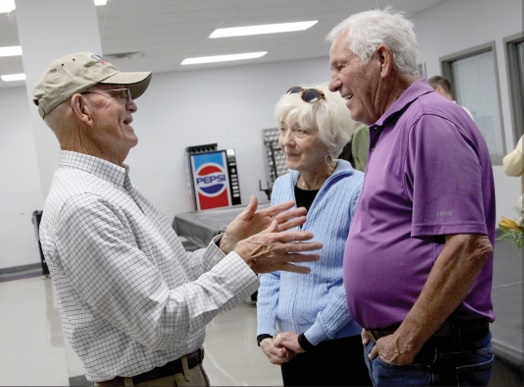Denali to drain wastewater residuals lagoons in Missouri
The draining of Denali Water Solutions’ storage lagoons in Newton, McDonald and Macon counties is scheduled to begin after the company’s signing of an administrative action issued by the Missouri Department of Natural Resources (DNR) on Jan. 31.
However, Denali’s compliance with the DNR order may reasonably be construed to be a temporary hiatus on lagoon operations.
The DNR action, called an Abatement Order of Consent (AOC), comes after Denali’s over-application of processing waste to the Gary Gilgen property, near Southwest City in McDonald County, on Oct. 3, 2023, which resulted in violations of the Missouri Clean Water Law.
On Nov. 29, 2023, the DNR ordered Denali to discontinue the land-application of its process waste materials in Missouri and to discontinue the use of its storage lagoons.
In the Jan. 31 administrative order, a timeframe is spelled out for the emptying of Denali’s lagoons. Pumping and hauling of the contents is scheduled to begin first — within seven days of the filing of the AOC — at the Gideon lagoon in McDonald County. Denali has been ordered to pump a minimum of 150,000 gallons a week from the basin until it is 50 percent empty, as measured from a two-foot freeboard from the top of the basin.
When the Gideon lagoon is 50 percent empty, pumping and hauling will begin at the Evans lagoon in Newton County at the same rate. Thereafter, pumping and hauling will alternate between the lagoons, unless, determined by the amount of their contents, one is determined to take priority over the other.
Pumping and hauling of the contents of Denali’s Callao lagoon, in Macon County, has also been ordered, at lower rates due to that basin’s smaller size.
The Callao lagoon has a capacity of 5 million gallons. Denali’s Evans and Gideon lagoons each have an approximate capacity of 14 million gallons.
When the lagoons are determined to be empty, if the DNR has not issued operating permits to Denali, the company may refill the lagoons with water to preserve the integrity of the basins’ liners.
According to the AOC, the contents of the lagoons shall either be taken to a permitted wastewater treatment facility capable of handling the processing residuals, or taken to an out-of-state destination for land application.
As spelled out in the AOC, the DNR also fined Denali for its violation of the Clean Water Law, in the total amount of $21,665, to be divided among McDonald, Newton and Macon County school districts, with the majority going to McDonald County.
Without admitting to liability or fault, Denali agreed to the terms of the AOC.
According to the AOC, after the conditions of the order have been satisfied, the AOC will terminate after the DNR issues effective permits for the operation of the three lagoons, or upon the DNR’s approval of Denali’s request to terminate.
Denali, in the meantime, issued the following statement in regard to their signing of the DNR’s AOC.
“Denali has worked collaboratively with the Missouri Department of Natural Resources to define alternatives for the storage basins Denali operates in the state,” the statement said. “Accordingly, Denali has agreed to begin pumping and hauling the food processing residuals stored in the basins to a Missouri wastewater treatment plant or to outlets out of state. Under this plan, Denali will also continue to seek ways to ensure the beneficial use of this resource either as a source of energy via anaerobic digestion or as a high-value fertilizer for farmers in other states. Nonetheless, the requirement to transport and process the basin contents in this manner is a costly decision that will impact Missouri farmers and food manufacturers.
“Recycling valuable, nutrient- rich food processing residuals is crucial to protecting water quality in Missouri and [is] necessary for the success of both food production and farming operations in the state. Denali continues to work with the Missouri legislature, the Missouri Department of Agriculture, and the Missouri Department of Natural Resources on long-term solutions to ensure positive outcomes for businesses, farmers, and communities in Missouri.”
Vallerie Steele, plaintiff in a lawsuit against the DNR, filed by Newton and McDonald County citizens’ group, SLUDGE (Stop Land Use Damaging Our Land and Environment) said she expects permits to come down the pike.
“I think we have all seen enough of Denali’s track record to know that ‘if’ [they are issued permits] is more a matter of ‘when,’” she said. “More than ever, we need legislative changes to ensure that Missourians are being afforded the necessary oversight, and that regulations are required to safeguard practices like sludge-spreading from poisoning us.”
Such legislation, proposed by State Rep. Dirk Deaton, R-Noel, cleared the House a couple of weeks ago.
Similar legislation, sponsored by State Sen. Jill Carter, R-Granby, which would also apply to Denali’s practices, is scheduled for a Missouri Senate hearing on Tuesday.




